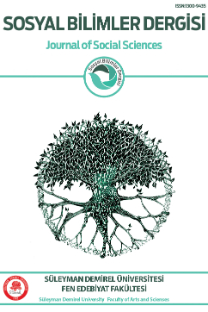Penelope Fitzgerald’ın “Sahaf” Romanında Yabancılaşma
Penelope Fitzgerald, Sahaf, yabancılaştırma tekniği, paradoksal fikirler, ahlak, cesaret
Defamiliarization in Penelope Fitzgerald’s Novel “The Bookshop”
Penelope Fitzgerald, The Bookshop, defamiliarization, paradoxical ideas, morality, courage,
___
- Adlington, H. (2018). Penelope Fitzgerald. Liverpool: Northcote House Publishers.
- Austen, J. (1882). Emma. Oxford: Oxford University Press.
- Emerson, R. W. (1909). Essays and English Traits. Harvard: Harvard Classics.
- Fitzgerald P. (2001). The Bookshop; The Gate of Angels; The Blue Flower. London: Everyman’s Library.
- Fitzgerald, P. (2005). A House of Air: Selected Writings. London: Harper Perennial.
- Fitzgerald, P. (2009). So I Have Thought of You: The Letters of Penelope Fitzgerald. London: Fourth Estate.
- Fitzgerald, P. (2013). The Bookshop. London: Fourth Estate.
- Flower, D. (2005). A Completely Determined Human Being. The Hudson Review, 57(4), 581-592.
- Gunn, D. P. (1984). Making Art Strange: A Commentary on Defamailiarization. The Georgia Review. 38(1), 25-33.
- Hollinghurst, A. (2014). The Victory of Penelope Fitzgerald. The New York Review of Books.
- Knight, C. J. (2016). Penelope Fitzgerald and the Consolation of Fiction. New York: Taylor & Francis.
- Lee, H. (2013). Penelope Fitzgerald: A Life. London: Vintage.
- Lively, G. (2019). Narratology. Oxford: Oxford University Press.
- Powers, K. A. (2014). Penelope Fitzgerald: A Life by Hermione Lee. Barnes and Noble.
- Powers, L. H. (1959). The Portrait of a Lady: The Eternal Mystery of Things. Nineteenth-Century Fiction. 14(2), 143-155.
- Read, B. (2014). How She Knows. The Paris Review.
- Sutcliffe, T. host. (1998). Penelope Fitzgerald and William Sieghart. A Good Read. BBC Radio 4Extra.
- Tonkin, B. (2000). ‘Mistress of the sublime’ Penelope Fitzgerald dies, 83. The Independent.
- Woolf, V. (2008). A Room of One’s Own and Three Guineas. Oxford: Oxford World’s Classics.
- ISSN: 1300-9435
- Yayın Aralığı: 3
- Başlangıç: 1995
- Yayıncı: Süleyman Demirel Üniversitesi, Fen-Edebiyat Fakültesi
Penelope Fitzgerald’ın “Sahaf” Romanında Yabancılaşma
Yeşim Sultan AKBAY, Beture MEMMEDOVA
Keçiborlu Senir'de Bulunan Osmanlı Dönemine Ait Üç Sarnıç
Ali Riza BİLGİN, Doğan DEMİRCİ
Salih Okan AKGÖNÜL, Burak SÖNMEZ, Merve YEŞİL, Mücella ALBAYRAK, Esra TÜTÜNCÜ, İbrahim ACUCE, Gülcan KAŞKA, Bilge HÜRMÜZLÜ, Hüseyin KÖKER, Murat FIRAT
Kendinden Tiksinme Ölçeğinin Geçerlik ve Güvenirlik Çalışması
An Ingot Fragment of Tin from EBA Royal Tombs at Alacahöyük, Anatolia
Evrim KAFA DURAN, Nezihat KÖŞKLÜK KAYA
Samuel Selvon’ın The Lonely Londoners (1956) Eserinde Karayip Göçü
